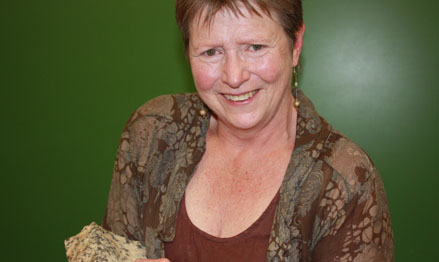Latest News Archive
Please select Category, Year, and then Month to display items
27 March 2023
|
Story Valentino Ndaba
![]()
This year, the University of the Free State will witness one of its biggest graduation seasons yet. A total of 19 ceremonies will take place this April. The Qwaqwa Campus will host four ceremonies from 14 to 15 April and the Bloemfontein Campus will host fifteen celebrations from 18 to 22 April 2023.
A grand total of 8 628 graduates will walk across the stage throughout the seven days. In addition, four honorary doctorates will also be conferred. Prof Stephen Brown will be awarded the Council Medal, Prof Mattheus Lötter is to receive the Chancellor's Medal.
Qwaqwa Campus Graduation Ceremonies

Bloemfontein and South Campus Graduation Ceremonies

For more information on guides and attires, click here.
Download the graduation schedule
here.
Prof Tredoux turns theories regarding the formation of metals on its head
2013-09-17
|
 |
|
Prof Marian Tredoux
17 September 2013 |
The latest research conducted by Prof Marian Tredoux of the Department of Geology, in collaboration with her research assistant Bianca Kennedy and their colleagues in Germany, placed established theories regarding how minerals of the platinum-group of elements are formed, under close scrutiny.
The article on this research of which Prof Tredoux is a co-author – ‘Noble metal nanoclusters and nanoparticles precede mineral formation in magmatic sulphide melts’ – was published in Nature Communications on 6 September 2013. It is an online journal for research of the highest quality in the fields of biological, physical and chemical sciences.
This study found that atoms of platinum and arsenic create nanoclusters, long before the mineral sperrylite can crystallise. Thus, the platinum does not occur as a primary sulphur compound. The research was conducted at the Steinmann Institute of the University of Bonn, Germany, as well as here in Bloemfontein.
Monetary support from Inkaba yeAfrica – a German-South African multidisciplinary and intercultural Earth Science collaborative of the National Research Foundation (NRF) – made this research possible. Studies are now also being conducted on other metals in the precious metal group, specifically palladium, rhodium and ruthenium.
The discovery of the nanoclusters and the combination with arsenic can have far-reaching consequences for the platinum mine industry, if it can be utilised to recover a greater amount of platinum ore and therefore less wastage ending up in mine dumps. This will signify optimal mining of a scarce and valuable metal, one of South Africa’s most important export products.
For Prof Tredoux, the research results also prove thoughts she already had some twenty years ago around the forming of platinum minerals. “Researchers laughed in my face, but the evidence had to wait for the development of technology to prove it.” Young researchers were very excited at recent congresses about the findings, since the new models can bring new insights.
“Chemistry researchers have been talking about platinum element clusters in watery environments for quite a while, but it was thought that these would not appear in magmas (molten rock) due to the high temperatures (>1 000 degrees celsius).”
Prof Tredoux has already delivered lectures at congresses in Scotland, Hungary, Sweden and Italy on this research.
Read the article at: http://www.nature.com/ncomms/2013/130906/ncomms3405/full/ncomms3405.html